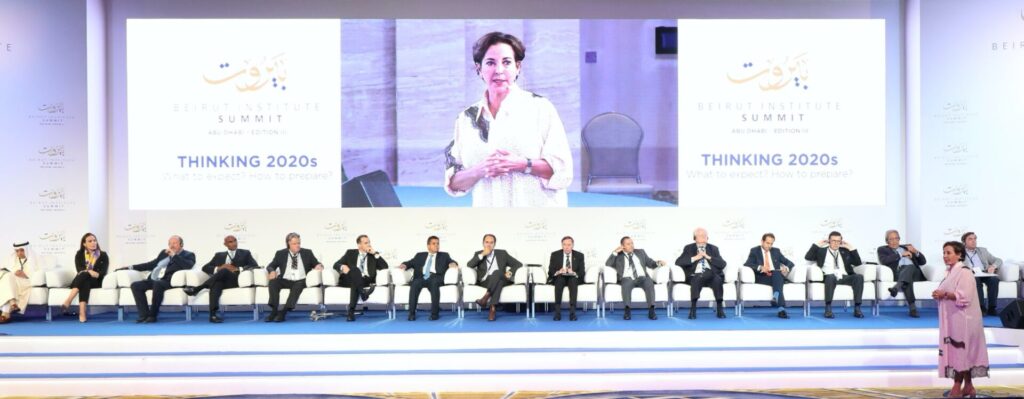Pathbreakers of Arab America—Raghida Dergham

By: John Mason / Arab America Contributing Writer
This is the eighty-fourth in Arab America’s series on American pathbreakers of Arab descent. The series features personalities from various fields, including entertainment, business, sports, science, the arts, academia, journalism, and politics. Our eighty-fourth pathbreaker is Raghida Dergham, a Lebanese-American journalist, Founder and Executive Chairman of the Beirut Institute, and Columnist for leading Arabic and English-language newspapers. She is one of the Arab world’s most well-known female journalists, renowned for her expertise in interpreting Middle Eastern and American cultures and politics to two distinct audiences. Raghida is also known for her incisive analysis of President Donald Trump’s approach to world leadership and the necessity to treat his words seriously.
Astute columnist and senior diplomatic correspondent, Raghida Dergham, is famous for her clarity on critical political and cultural issues faced by the U.S. and the Middle East
Raghida Dergham was born in Beirut in 1953 to parents of the Druze faith, Nabih and Bahia Dergham. She came to the U.S. in 1970, at the age of 17, to study at the State University of New York at Plattsburgh. There, Raghida studied creative writing and journalism, graduating in 1974. Before traveling to the U.S., she had an early start in journalism at the age of 15, when she and her friend Hanan al-Shaykh, a Lebanese author, published articles in Beirut newspapers and magazines.
In 1974, Dergham became a reporter in Boston, followed by the creation of a bilingual weekly radio show. Then, in 1976, she became a foreign correspondent in New York. At a very young age, Raghida had determined that Arab perceptions of a woman’s role in society would be circumscribed, noting, “In my culture, for a woman to enter the field of politics, in terms of journalism, this is not the norm. A woman cannot think this way. A woman cannot do this.”
Against such odds, moving forward in her career, Dergham became a columnist with the ‘Al-Hayat’ newspaper in 1989. She also took on the ‘analyst’ role for several news channels, including the BBC, CNN, NBC, MSNBC, Al-Jazeera, and the Lebanese Broadcasting Corp (LBC). Raghida’s writing has also appeared in publications including the New York Times, Washington Post, and Newsweek. She has covered major news stories over the decades, including the Madrid Middle East Peace Conference, Islamic Summits, Non-Aligned Summits, the Casablanca Economic Summit, the Denver Summit of Eight, and the Extraordinary Amman Summit.
Covering important personalities is another part of Raghida’s work, including accompanying UN Secretary General Kofi Annan on his tours of the Middle East, interviewing Arab and Muslim leaders, namely, Jordan’s King Abdallah and the late King Hussein, Pakistan’s President Parviz Musharref, and Lebanon’s President Michel Suleiman. Egypt’s President Hosni Mubarak, Palestinian Presidents Mahmoud Abbas and Yasser Arafat, among many other leaders. Honoring her for her work over decades, the New York State University at Plattsburgh awarded her an honorary doctorate degree in letters in 2003 and a Distinguished Alumna place in the University’s Hall of Fame.
Given Raghida’s place in journalism as a “tell-it-like-it-is” reporter, it was perhaps inevitable that she came into trouble with one government or another. Hence, it happened that the Lebanese government disagreed with her reporting and suspended her Lebanese passport while she was in Beirut on assignment covering UN Secretary General Kofi Annan on June 9, 2000. Later, Lebanon said it had acted as a result of a May 2000 panel discussion, in which Dergham participated, that included a representative from the Israeli government. The panel discussion was sponsored by the Washington Institute for Near East Policy in Washington, D.C. Dergham was subsequently charged with “dealing with the enemy,” a crime in Lebanon, and a trial was set for June 2001 in Lebanon.
Gaining support from outside of Lebanon, the Committee to Protect Journalists took up Dergham’s case, responding: “We view the treason case against Dergham as part of a pattern of state harassment intended to punish an independent journalist for doing her job. The government of Lebanon has shown contempt for press freedom and the free public debate that is essential in a democratic society. The charges should be dropped, and Dergham should be free to work without further harassment.” In responding to the government’s verdict, Raghida refused to appear in the military court; consequently, the trial was never held, and the charges were dropped.
Dergham is the founder and executive chairman of the Beirut Institute, an independent, non-partisan, solution-oriented think tank for the Arab region. As described on its website, the Beirut Institute is “a catalyst for intergenerational, innovative, result-driven thinking relating to current and future world policy opportunities and challenges, conducting high-quality independent analyses.” Its focus is on “discovering ways to enrich current relations with the East and the West.” And one of the Institute’s major objectives is to “proudly serve as a catalyst for intergenerational, innovative thinking with contemplative policy options.”

The Beirut Institute describes its Summits as convening a wide spectrum of thinkers, including political leaders, senior policymakers, prominent intellectuals, leading CEOs, and civil society leaders to reflect on the evolving relationship between the Arab region and the world. Raghida’s intellectual role in the Institute is as a specialist on strategic international relations. This role has earned her many accolades, including membership on the Council on Foreign Relations and an Honorary Fellow at the Foreign Policy Association. Dergham has also served on the International Media Council of the World Economic Forum and is on the Development Advisory Committee of the InterAcademy Partnership, a global network of science academies.
Dergham on Why the World needs to take Donald Trump seriously—just listen to his words
Only six days following President Donald Trump’s second inauguration on January 20, 2025, Raghida penned a significant, insightful article on what we might expect from his second presidency. Whether or not one sides with his ‘Make America Great Again’ theme, she believes we should listen to him carefully. She notes that Trump is dominating global headlines and that world leaders are listening to him seriously, some out of fear of “the consequences of challenging him” or even benefiting from his policies. Further, Dergham states, “Today, he is a leader making bold, independent decisions with a near-reckless confidence, leveraging his political savvy to implement unconventional policies. While he remains divisive at home and controversial abroad, he has already achieved one of his key goals: commanding serious attention worldwide.”
Raghida suggests it is important to listen to Trump’s tone, as well as his words. She notes, “When addressing the World Economic Forum, live from the White House to Davos, Trump adopted a blunt tone with European nations and the financial world, and his message was unmistakably clear: under his leadership, America’s greatness would no longer come at its own expense—rather the other nations benefiting from it would be expected to shoulder the financial burden. To business leaders, he highlighted the advantages of manufacturing and producing in America, offering tax incentives, but for those unwilling to comply, he warned of steep tariffs. His message boiled down to this: America’s greatness, and the pragmatic economic policies this demands, is all that matters to him.”
According to Dergham, Trump welcomes others as partners and investors, but if they don’t accept, they have tariffs and other restrictions on their goods to look forward to. Even such favored partners as Saudi Arabia, whose leader, Crown Prince Mohammed bin Salman, Trump loves hobnobbing with, must heed his warnings on lower oil prices and increased Saudi investment in the U.S. Trump sees himself as a peacemaker, “but he aims to achieve this through unorthodox methods, not traditional diplomatic norms.”
Strategically, Raghida sees Trump as intentionally avoiding U.S. involvement in wars, stating that “he has a genuine aversion to them.” She also sees Trump as refusing to involve himself in “conflicts he deems secondary to U.S. interests, such as the Palestinian Israeli conflict or the emerging Syrian question.” Rather, his focus is more home-based, as in disputes with Mexico or on “his grand proposals” such as those involving Greenland, Panama, and even Canada. Raghida also cites such additional Trump issues as thwarting China, or “Stargate,” namely, building an advanced AI infrastructure in the U.S.
Dergham is correct in going beyond issues just involving the Middle East to address more globally strategic thinking, mainly because this is where Trump is taking us. He is doing so through his speaking, which, as she says, “in his own way, embodies a kind of simplicity and clarity of purpose.” Raghida has served us well for many decades, keeping us straight on news coming from the Middle East and how it “spins” in the U.S., and in helping us to see the “bigger picture” and how it affects us in the U.S., the Middle East, and the rest of the world.
Sources:
–“Raghida Dergham,” Wikipedia Series on Arab Americans, 2025
–“Raghida Dergham,” Consortium of Lebanese American University and The Arab Institute for Women
–“Raghida Dergham,” Huff Post 1/17/2018
–“Beirut Institute,” Program Description (no date)
–“Why Is Donald Trump Now Taken Seriously Around the World?” Raghida Dergham, Linked In, 1/26/2025
John Mason, Ph.D., focuses on Arab culture, society, and history and is the author of LEFT-HANDED IN AN ISLAMIC WORLD: An Anthropologist’s Journey into the Middle East, New Academia Publishing, 2017. He has taught at the University of Libya, Benghazi, Rennselaer Polytechnic Institute in New York, and the American University in Cairo; John served with the United Nations in Tripoli, Libya, and consulted extensively on socioeconomic and political development for USAID and the World Bank in 65 countries.
The views and opinions expressed in this article are those of the author and do not necessarily reflect the position of Arab America. The reproduction of this article is permissible with proper credit to Arab America and the author.
Want more articles like this? Sign up for our e-newsletter!
Check out our blog here!
P








